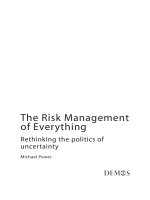Mastering The Essentials of Sales_6 docx
Bạn đang xem bản rút gọn của tài liệu. Xem và tải ngay bản đầy đủ của tài liệu tại đây (258.16 KB, 23 trang )
Question. Are you just
dreaming of success? Many
people dream big dreams and
get excited by possibilities but
stop short of taking action.
Just this week a salesman told
me he dreamed of earning
$300,000 within the next five
years, but he has no idea how
to make it happen.
2. The plan. In 1499, the
Italian genius Leonardo da
Vinci studied birds in flight
and drew sketches of glider
planes. He created a detailed drawing of a flying ma-
chine that resembled a helicopter. Leonardo da Vinci
had great vision, but his immediate environment
could not use his plans.
Question. Are you merely planning for your suc-
cess? Unless your vision is aligned with the capabili-
ties of your team, your best plans will only collect
dust. A savvy sales manager once told me, “A plan is
only as good as your team’s ability to act on it.”
3. The model. In 1899 the Wright brothers studied the
flight of hawks and built their first biplane kite. The
glider plane served as the model for developing ad-
justable wings to control basic flight movements. In
December 1903, Orville and Wilbur Wright’s motor-
ized plane flew 852 feet and achieved worldwide
fame.
MASTERING THE ESSENTIALS OF SALES
108
ACTION TIP
Like an architect
drawing his vision of a
building, sketch out
your vision of success.
Keep that vision in your
wallet as a reminder.
Many successful
businesses were created
based on a few basic
ideas written on a
cocktail napkin.
Question. Do you launch a new sales plan before
making sure it will fly? For example, it is not uncom-
mon for sales managers to purchase notebook com-
puters and off-the-shelf software for their entire sales
force without testing it on a small group of salespeo-
ple first. Remember, to perform at your best, begin
with a successful test.
4. The space shuttle. In 1981, the first space shuttle
skyrocketed into orbit. To take off, the shuttle’s 4.5
million pounds has to defy the law of gravity. With
the help of booster rockets, the space shuttle reaches
an altitude of 150,000 feet within 120 seconds.
Question. What power will skyrocket your
sales? More knowledge? Better skills? Greater moti-
vation? Salespeople often believe that they can sky-
rocket their sales without a fresh source of energy.
Remember, people who succeed go through all four
phases: They dream big dreams; they develop realis-
tic plans; they test several possibilities; and they in-
vest as much energy as needed for their sales to take
off. Achieving success is not rocket science, but it is
only possible if we follow the blueprint from dream
to reality.
MASTERING THE ESSENTIALS OF SALES
109
This page intentionally left blank
111
M
any salespeople start their careers filled with hope,
anticipation, and determination. They are willing to
give their very best to reach sales and income goals. After a
few years they get used to receiving larger checks and dis-
cover they are spending their money faster than ever. One
day, these salespeople realize they are driven by the need
to meet bigger and bigger monthly payments. Since their
spending faucet is wide open, they have to carry bigger
buckets to replenish their reservoir. As a result, they feel
depleted and often complain about the futility of the “rat
race.” What caused the shift from reaching for lofty goals to
simply hustling for money? What caused the transforma-
tion from being open-minded to becoming single-minded?
DO YOU USE THE RIGHT FUEL
FOR YOUR ENGINE?
27
Copyright © 2006 by Gerhard Gschwandtner. Click here for terms of use.
Most important, what hap-
pened to the hope, anticipa-
tion, and determination that
made selling so exciting in the
early days? The answer is sim-
ple: These salespeople ran out
of fuel.
Of course, the human mind
does not work like a machine,
but just imagine for a moment
that it is a special, powerful
six-cylinder engine. But un-
like a mechanical engine that
functions well on one type of fuel, the human engine needs
different kinds of fuel in order to achieve its peak potential.
Imagine that each one of the six cylinders is connected to
its own special fuel reservoir. These six reservoirs fuel the
engine of success:
1. The fuel of higher meaning. If you dedicate your
life to a higher cause than yourself, you will never
want to stop contributing. Create enough meaning
and you will create enough energy. If you limit the
meaning of your work to money, you will soon run out
of energy.
2. The fuel of joy. Never miss an opportunity to create
joy for others. Decide today that it won’t hurt you to
smile more often or to share a laugh with a client.
Life is much more than doing business. If you put
more fun into your work, you will get more fun out of
your work.
MASTERING THE ESSENTIALS OF SALES
112
REMINDER
There is an untapped
reservoir of capabilities
within each of us that
helps us deal with life’s
toughest challenges.
Once we make the effort
to dig deeper, the
human brain will
organize itself to tackle
any challenge.
3. The fuel of leadership. Seek out good leaders.
Allow them to stretch your abilities. Store away their
lessons and use them as a fuel reserve to get through
tough times.
4. The fuel of goals. Goals are the architects of hope.
If you run out of goals, all other cylinders will in-
evitably grind to a halt. Salespeople need to plant
hope in the fertile soil of the imagination. Lack of
hope inevitably leads to depression.
5. The fuel of teamwork. The days of the lone ranger
in selling are history. Today’s winners are part of a
successful team. If you help other people win, you
will have a team of people helping you win.
6. The fuel of rewards. Enjoy the fruits of success,
share the credit with your team, and preserve the
lessons you learned from each victory. Maintain an
attitude of gratitude. View each peak performance as
a refueling stop from which you can launch your next
success.
If you find yourself only running on two cylinders,
check your reservoirs and replenish them today. It
may surprise you, but all the fuel you’ll ever need to
reach the highest peaks is already stored within you.
It’s up to you to release the valve that will let it flow.
MASTERING THE ESSENTIALS OF SALES
113
This page intentionally left blank
115
O
ne day not long ago, at a luncheonette in our small
town, an elderly gentleman seemed to be looking for a
place to sit. I asked him to join me, and we started talking.
He was intensely curious. Within minutes he knew that I
was born and raised in Austria, that I started Selling Power
magazine, and that we have 200,000 subscribers in 67 coun-
tries worldwide. Each time he had collected a piece of infor-
mation, he asked for more. He was genuinely interested,
which made it a pleasure for me to answer his questions.
Then, reversing the process, I found out that he had
started his career as a car salesman. Later he moved on to
real estate, invested in commercial properties, and later de-
veloped office buildings and shopping centers. As he told
THE VALUE OF CURIOSITY
28
Copyright © 2006 by Gerhard Gschwandtner. Click here for terms of use.
his story, I realized that I was talking to one of Virginia’s
richest men, whose net worth exceeds $340 million. I was
impressed with his humble and modest demeanor. When-
ever there was a pause in the conversation, he didn’t fill the
space by talking more about himself, but continued with
questions designed to learn more about Selling Power.
After we finished our lunch, he asked me to send him a
magazine so he could share some selling ideas with his
sales manager.
Our conversation made me wonder about the power of
curiosity. People who are genuinely curious ask more ques-
tions and tend to get more answers. In return they learn
more. While many trainers and consultants teach the im-
portance of asking questions and the art of good listening,
nobody teaches us how to harness the power of curiosity.
Curiosity moves people from complacency to action.
What fuels curiosity? Interesting and deeper questions
move people to the outer branches of the ever-growing tree
of information. As more new pieces of the puzzle emerge,
we feel more compelled to uncover the entire picture. Cu-
riosity leads the mountain
climber to higher elevations.
Curiosity compels the inven-
tor to think deeper. Without
Thomas Edison being curious
about finding a filament that
would emit light but wouldn’t
burn up in a vacuum tube,
there would be no light bulb.
Without Madame Curie won-
dering about a curious sub-
MASTERING THE ESSENTIALS OF SALES
116
SUCCESS PRINCIPLE
We live in a world that
appears to reward
superficiality, but these
rewards don’t satisfy our
souls. Greater rewards
go to those who are
curious and engaged in
the pursuit of meaning.
stance that emitted light when she left it in a petri dish
in her laboratory overnight, there would be no X-ray
technology.
Curiosity is the most overlooked sales tool. Curious
salespeople move from the traditional role of the transac-
tion agent up to the level of a business partner who can
help transform the customer’s business. Curiosity is the se-
cret to mankind’s progress. At one point, the leading scien-
tists of the world thought that the earth was flat and that
anyone going to the edge would fall off. People who lack cu-
riosity never bother to expand their horizons. They will
never know of the riches waiting for them if they only
bother to move outside their comfort zone. Curiosity led my
luncheon partner to realize that living outside his comfort
zone ensures a far more interesting and dynamic life.
MASTERING THE ESSENTIALS OF SALES
117
This page intentionally left blank
119
C
oncentration is one of the most important keys to suc-
cess. If we tirelessly apply our physical and mental en-
ergies to one problem, we will meet with great success. So
how can we improve our powers of concentration? Golf
champion Arnold Palmer believes that concentration de-
mands good self-knowledge. He explains, “The secret of
concentration is the secret of self-discovery. You reach in-
side yourself to discover your personal resources and what
it takes to match them to the challenge.”
People who have difficulty concentrating on their jobs
often blame others. Brendan Francis argues, “Other peo-
ple’s interruptions of your work are relatively insignificant
compared with the countless times you interrupt yourself.”
THE POWER OF CONCENTRATION
29
Copyright © 2006 by Gerhard Gschwandtner. Click here for terms of use.
Research shows that with
improved concentration comes
an increased flow of productive
ideas. TV producer Norman
Lear told Selling Power that
there is an infinite flow of cre-
ativity we can all tap into, pro-
viding we concentrate without
forcing the flow. If we are too
preoccupied or self-centered, the flow will stop. If we forget
ourselves in the task, the creative flow will increase.
Mihaly Csikszentmihalyi (pronounced Chick-SENT-
me-hi), professor of human development at the University
of Chicago, once described how superachievers concentrate
to reach “the zone” of total absorption. He said that anxiety
kills the flow, as does boredom. In the same way that an
archer pulls the string against the bow to create tension, a
superachiever fills the mind with a challenge that causes
new ideas to flow with high velocity toward a mental bull’s-
eye.
Olympic athletes often create a series of ritual steps
that help them concentrate on the present moment. Their
objective is to forget the preoccupation with success and
failure and to focus all mental energies on the challenge at
hand.
The success-oriented mind is like a magnifying glass
that focuses the rays of the sun in one concentrated spot.
The magnified intensity of the rays dissipates the moment
the glass is out of focus. When our minds wander from sub-
ject to subject, our productivity drops, our energies get
sapped, and our motivation dissipates.
MASTERING THE ESSENTIALS OF SALES
120
SUCCESS PRINCIPLE
A diamond has the same
chemical composition as
a hunk of coal, the only
difference being that it
decided to concentrate a
lot longer.
Inventor Thomas A. Edison once told a reporter how to
use the power of concentration to achieve something of sig-
nificance. “You do something all day long, don’t you? Every-
one does. If you get up at 7 o’clock and go to bed at 11, you
have put in 16 good hours, and it is certain with most peo-
ple that they have been doing something all the time. They
have been either walking, or reading, or writing, or think-
ing. The only trouble is that they do it about a great many
things, and I do it about one. If they took the time in ques-
tion and applied it in one direction, to one object, they
would succeed. Success is sure to follow such application.
The trouble lies in the fact that people do not have an
object—one thing—to which they stick, letting all else go.”
We can all build a great mental framework in which con-
centration will flourish. If we apply razor-sharp concentra-
tion, there is nothing that can hold us back from winning.
MASTERING THE ESSENTIALS OF SALES
121
This page intentionally left blank
123
E
verybody wants to be successful, but not everyone can
find the way to success. Why? I believe that most people
simply get lost. Let me explain. Have you ever looked up a
word in a dictionary? Your intention may have been to
check the definition of a word. You go through the pages al-
phabetically. Let’s say that the word you’re looking for is
perspiration. On the way to the P’s you stumble onto the
word orotund and wonder what it means. You find out that
it means pompous. Since you’re on your way to the P’s you
glance at pompous and find pretentious, which leads you to
ostentatious, and in the process you forget about perspira-
tion altogether. The result: lots of sweat, but no progress.
The cause: lost in thought.
HOW LONG DO YOU
STAY FOCUSED?
30
Copyright © 2006 by Gerhard Gschwandtner. Click here for terms of use.
Let’s take another example.
Have you ever gone to a gro-
cery store with the intention of
getting milk, cereal, and bat-
teries and walked out with 12
or 15 items, but no milk? What
prompted you to deviate from
the milk aisle and pick up two
magazines, cookies, ice cream,
mouthwash, and a can of cling
peaches? The cause: lost in
action.
A third example will drive the point home even more
clearly. Have you ever sat down in front of the TV just to
relax for a few minutes and found yourself two hours later
engrossed in a movie, forgetting that you have a life? The
cause: lost in images.
As the world grows in complexity, there are more
chances for getting lost in thought, action, and imagina-
tion. When we get lost, we’re like children on a rocking
horse, fully engaged, always in motion but going nowhere.
If we get lost in such simple tasks as shopping, how
about more complex tasks such as the pursuit of a large ac-
count, the management of a team, or the pursuit of our
career?
In order to pursue success, we need to be aware of the
impulses that lead us to run in place. The intention of the
world is to divert us from building a path to success.
Heavyweight boxing champion George Foreman once told
Selling Power that “Success begins with a decision.” If you
set your mind to reach a goal, you’ll make certain that you
MASTERING THE ESSENTIALS OF SALES
124
SUCCESS PRINCIPLE
A chicken that crosses
the road has more focus
and determination than
a Harvard MBA who gets
lost in the subtleties and
intricacies of making the
strategic decision to
move from point A to
point B.
reach it. You’ll say no to all distractions, detours, and time-
wasting activities. As a result, you can clearly focus on
reaching your destination without detours. It is the deci-
sion to be successful that helps you develop an internal
guidance system that keeps you moving upward and
onward.
Think about the dreams you had 10 years ago. What
happened to them? What about the five-year goal you set
five years ago? Where did it go; where did you go? What
about today? Where do you want to be by the year 2010?
Sylvester Stallone once reflected upon his own success say-
ing, “I am not the smartest or the most talented person in
the world, but I succeeded because I kept going and going.”
Those who go furthest are the ones who stay focused on the
decision to pursue their life’s mission.
MASTERING THE ESSENTIALS OF SALES
125
This page intentionally left blank
127
S
uccessful people know that lack of steady commitment
to staying productive waters down results and leads to
wasted time and effort. So why do so many people get
pulled off the productivity track? Here are three common
causes:
1. Multitasking. Achievement-oriented people often
tackle two or more tasks at once without doing any
task well. You can hear the telltale signs of “multi-
tasking” during many phone conversations—an en-
velope being ripped open, a keyboard clicking, a
modem dialing. The caller is reading the morning
mail, typing a letter, or checking email.
FOCUS ON PRODUCTIVITY
31
Copyright © 2006 by Gerhard Gschwandtner. Click here for terms of use.
2. Opportunity chasing.
Often at trade shows a sales-
person engages you with a
quick smile and answers a few
questions. As you study the
product, the salesperson is
reading the name tags of peo-
ple standing behind you. At
business conventions people
often dart around like hunters
rather than zeroing in on one
prospect, planting seeds and
nurturing a relationship like
farmers.
3. Brief mental escapes. When you are meeting with
a customer, do your thoughts race ahead or drift back
to unfinished business?
A noted psychologist, Van Reisdorf, found that
unfinished business has a disruptive effect on the
mind. A fight in the morning may leave its imprint
on our thoughts throughout the day. A canceled sale
can negatively impact your attention span on the
next call. It can throw your focus into disarray. On
the other hand, a focused sales executive can accom-
plish more in three calls than an unfocused one can
in ten. Here are a few suggestions for increasing your
ability to focus on productivity.
• Make a decision to live one moment at a time and
to think one thought at a time. To clearly focus
your thoughts, think of a laser gun, not a shotgun.
MASTERING THE ESSENTIALS OF SALES
128
ACTION TIP
Develop a to-do list
before you go to bed
each night. You will
sleep better and not
worry about the amount
of unfinished business
ahead of you. At the end
of the next day you will
feel a sense of peace
when you cross items off
your list and start your
to-do list for tomorrow.
• Focus on one person at a time. When you are with
a customer, be with that person 100 percent. No
other sound or sight should be more important.
• Start with a clean slate. Brush away any mental
cobwebs before you meet with your next customer.
When you start mentally with a clean slate, you
can become a solution provider, but when your
thoughts revolve around you, you become the ob-
stacle to a sale.
• Set daily goals. There is no need to pay attention to
everything in sight. Instead of watching mindless
TV, quietly reflect on your day and set a goal for a
more focused and mindful tomorrow. Stop subdi-
viding your focus into fragments. Someone wise
has said that the past is to be learned from and not
lived in; the future is to be planned for, not para-
lyzed by; and the present is to be enjoyed right
now.
MASTERING THE ESSENTIALS OF SALES
129
This page intentionally left blank









